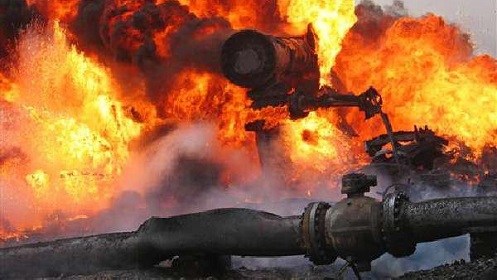
Each year, Nigeria loses trillions of naira to oil theft through deliberate sabotage and vandalisation of the pipelines. Surprisingly, this criminal activity is daily assuming a fear-provoking proportion as the vandals are becoming more daring in their nefarious activities.
For instance, it costs the Nigerian government, oil companies and communities an estimated $14 billion each year and the country loses over 150,000 barrels of crude oil to these criminal elements every day – meaning that about $6.5million is lost to pipeline vandalisation daily.
Sadly, the scale of pipeline breaches has now reached epidemic proportions and this criminality remains an intractable challenge to the Nigerian oil and gas-dependent economy. From Escravos to Warri and from Lagos to Abuja, the nation’s pipeline network, running into thousands of kilometres, is constantly under threat of vandals.
According to a report by the government’s National Oil Spill Detection and Response Agency (NOSDRA), no fewer than 900 sabotage incidents were recorded last year alone across the 12,700km pipeline belonging to local and international companies.
The thefts range from small-scale pilfering to industrial-scale theft carried out with the active connivance of some rogue elements in the Nigerian military, corrupt corporate executives and community leaders.
The devastating effects of pipeline vandalisation include, among others, huge economic losses from pipeline and plant shutdown, environmental pollution, fire outbreaks usually resulting in loss of lives, scarcity and shortage of petroleum products as well as decrease in electricity supply with the attendant socio-economic problems.
It has also resulted in huge human toll as thousands of people, including suspected vandals, have been roasted to death in fire outbreaks and explosions along the Nigerian National Petroleum Corporation (NNPC) pipelines in various parts of the country. One of the most deadly of these blasts occurred on October 18, 1998, when an NNPC pipeline exploded in Jesse. Reports then said the explosion was caused by thieves trying to break open a pipeline in order to siphon oil. The blast caused a fire that killed hundreds within hours, destroying surrounding farmlands and villages. Till date, the affected communities are yet to recover from the scars of that incident.
Pipeline vandalisation is one major reason why the refineries will not work as finished products pumped from the refineries are diverted through compromised pipelines into the waiting vessels of pipeline vandals. This illegal activity has become a thriving business, and stemming it will be difficult because grand-scale oil theft is now a very big business with a well-connected few creaming off hundreds of millions of dollars every year. Thus, curbing this criminality is critical in resuscitating the nation’s ailing refineries by ensuring ease of petroleum products transportation to local depots, eliminating importation and crashing fuel prices.
More worrisome also is that these vandals have moved from just pipeline vandalisation and oil theft to that of killing and even kidnapping those saddled with the task of monitoring and protecting the pipelines across the country. Worse still is how the concerned communities do not cooperate with relevant security agencies to either arrest the criminals or protect the oil pipelines within their communities.
In our opinion, the government and the oil companies must strengthen the security apparatus to check this growing tendency, as well as embark on aggressive anti-pipeline and oil theft awareness campaigns to sensitise the people on the damaging effects of this illegal activity on them, their communities and the country in general.
Aside this, government must begin to explore more creative ways of managing its extensive network of pipelines. It is evident that the security of the pipelines cannot be achieved by the use of threat or force, by militarising the region. This strategy has proved ineffectual over the years. A viable alternative, therefore, is the integration of indigenous oil and gas companies with the requisite capacity into the pipeline management subsector and by providing jobs to unemployed youths and giving communities a share of the legitimate oil profits.
We believe also that a multi-stakeholder and multi-dimensional framework is required to tackle this problem. The communities, oil-companies and government can through collaborative efforts stem this criminality and mutually benefit from each other’s efforts at curbing pipeline vandalism and oil theft as well as helping the economy to grow.
Above all, government should step up efforts at fully deploying a digital system of surveillance. This technology may appear to be expensive, but the overall benefits , particularly what the government will be saving from vandalism, is worth the investment.
The fight against oil pipeline vandals and theft is tough but not insurmountable. All that is needed is for the law enforcement agencies and other stakeholders to be committed to the cause of ending this criminal sabotage of the country’s resource base.
END

Be the first to comment